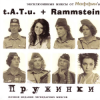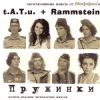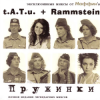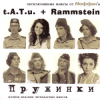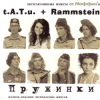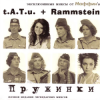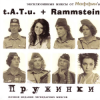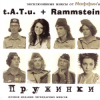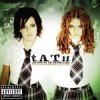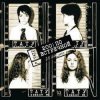
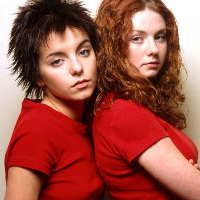
t.A.T.u. — a legendary Russian pop duo that became a global phenomenon in the early 2000s. The group gained fame for its provocative image, bold music videos, striking aesthetics, and distinctive sound. Within just a few years, t.A.T.u. conquered charts around the world, entered heavy MTV rotation, won international awards, and forever secured their place in pop culture history as a symbol of freedom and defiance.
Formation and Early Years
The t.A.T.u. project was created in 1999 by producer Ivan Shapovalov, composer Sergey Galoyan, and lyricist Elena Kiper. The main idea was to create a group that combined teenage rebellion, emotion, and a controversial image. Two vocalists were chosen at auditions — Yulia Volkova (born February 20, 1985) and Elena Katina (born October 4, 1984), both former members of the children’s group Neposedy.
The name t.A.T.u. is derived from the Russian phrase “ta lyubit tu” (“she loves her”), immediately setting a provocative tone for the project. The image of two schoolgirls in love, unafraid to express their feelings, became part of the concept — a reflection of rebellion against the conservative norms of the late 1990s.
Breakthrough and Success in Russia
In 2000, the debut single “Ya Soshla s Uma” (“All the Things She Said” in Russian) became a sensation across Russia and the CIS. The video, filmed as a school drama featuring a kiss between the main characters, sparked scandal and immense interest. The song topped the charts, and the group instantly gained cult status.
This was followed by hits like “Nas Ne Dogonyat” (“Not Gonna Get Us”) and “30 Minut” (“30 Minutes”), solidifying the duo’s success. In 2001, they released their debut album “200 po Vstrechnoy” (“200 km/h Against the Traffic”), which became multi-platinum and remains one of the best-selling albums in modern Russian music history. It was also translated into English for international release.
Global Fame
In 2002, t.A.T.u. signed with Interscope Records and released their English-language album “200 km/h in the Wrong Lane”. The lead single, “All the Things She Said”, became a worldwide hit, reaching #1 in the UK, Germany, and Australia, and entering the Billboard Hot 100 Top 20 in the US. The rain-soaked video became one of the most iconic visuals of the 2000s.
The follow-up single “Not Gonna Get Us” reinforced their success, and their appearances at the MTV Europe Music Awards and world tours made t.A.T.u. the first Russian act to achieve such global recognition.
The album went platinum in over ten countries, earning MTV Europe Music Awards trophies and a Grammy nomination. At their peak, t.A.T.u. performed on Top of the Pops and became symbols of a new wave of Eastern European pop.
Eurovision and Peak Popularity
In 2003, t.A.T.u. represented Russia at the Eurovision Song Contest in Riga with “Ne ver’, ne boisya, ne prosi” (“Don’t Believe, Don’t Fear, Don’t Ask”), taking 3rd place. Despite controversies and mixed jury reactions, their performance became one of the most talked-about in Eurovision history.
Evolution and Image Change
After their initial success, the duo began to move away from the schoolgirl image to show artistic maturity. In 2005, they released “Dangerous and Moving” (Russian version: “Lyudi-Invalidy”), featuring hits like “All About Us”, “Friend or Foe”, and “Gomenasai”. The album included collaborations with Sting and Dave Stewart (Eurythmics), earning praise for its high production quality.
Hiatus and Breakup
By 2008, t.A.T.u. began pursuing separate creative directions. Their conceptual album “Vesyolye Ulybki” (English: “Waste Management”) did not match their previous commercial success. After releasing the single “Bely Plaschik” (“White Robe”) and participating in film and TV projects, the duo gradually ceased joint activities.
In 2011, they officially announced a hiatus, and in 2014 — an official split. Yulia Volkova and Elena Katina each began solo careers but have both acknowledged that t.A.T.u. remains an integral part of their lives.
Solo Projects and Comeback
Elena Katina released the album “This Is Who I Am”, praised by fans for its lyricism and melodic style. Yulia Volkova focused on pop and R&B, appearing in various TV shows. In 2021, Yulia became a Moscow City Duma deputy, combining public service with artistic work.
Reunion and Recent Performances
In 2022, t.A.T.u. announced a reunion for an anniversary tour and new projects. The duo performed at the Vmeste My festival, presenting updated versions of their classic hits. Fans warmly welcomed the return of this iconic act.
In 2023, they held a major concert in Moscow with a live band, and in 2024, they announced plans for a documentary and remastered reissues of their classic albums with bonus tracks. The group is also considering releasing new material.
Interesting Facts
- t.A.T.u. were the first Russian group to enter the UK Singles Chart Top 10.
- The video for “All the Things She Said” was banned by several TV channels in the US and Asia but became viral and ranked among MTV’s Top 100 videos.
- “Nas Ne Dogonyat” was featured during the Sochi 2014 Winter Olympics opening ceremony.
- The duo inspired many modern artists, including Billie Eilish and Charli XCX, and their tracks frequently trend on TikTok and in remixes.
Legacy
t.A.T.u. became a symbol of an era, proving how bold concepts, strong melodies, and daring visuals can elevate Russian music to a global level. Their songs continue to feature in films, series, and commercials, with the duo considered a cultural code of the 2000s.
Today, t.A.T.u. remain one of the most recognizable and discussed Russian groups in history, and their return is a nostalgic event for millions of fans worldwide.
Discography
- 200 po Vstrechnoy (2001)
- 200 km/h in the Wrong Lane (2002)
- Dangerous and Moving / Lyudi-Invalidy (2005)
- Vesyolye Ulybki / Waste Management (2008 / 2009)
Conclusion
t.A.T.u. is more than just a pop group — it’s a cultural phenomenon that shaped an entire generation. Their art embodies courage, sincerity, and independence. Today, the duo returns to remind the world that “Nas Ne Dogonyat” (“Not Gonna Get Us”) is not just a song — it’s the anthem of an era.



